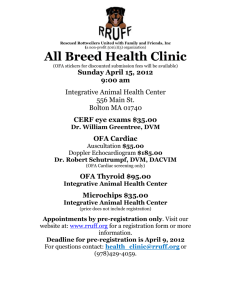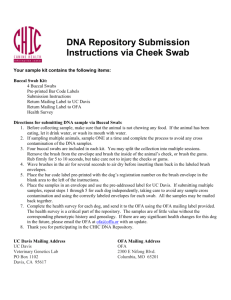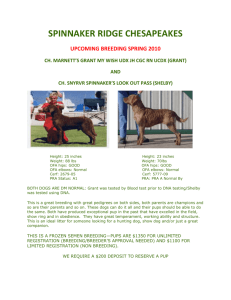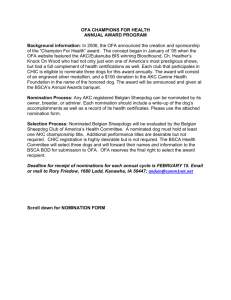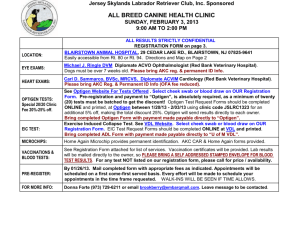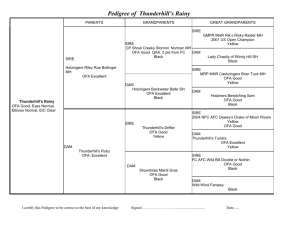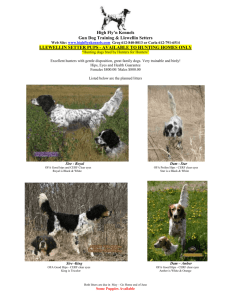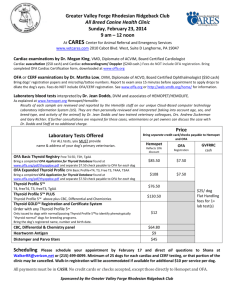The CHIC DNA Repository - Irish Setter Club of America
advertisement
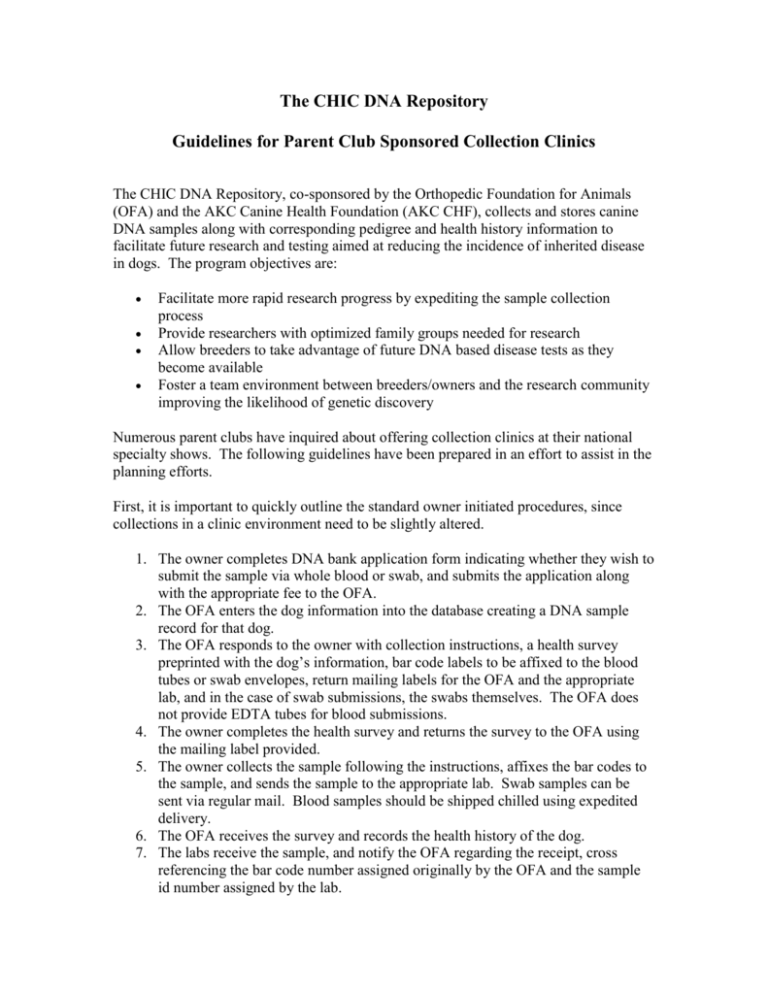
The CHIC DNA Repository Guidelines for Parent Club Sponsored Collection Clinics The CHIC DNA Repository, co-sponsored by the Orthopedic Foundation for Animals (OFA) and the AKC Canine Health Foundation (AKC CHF), collects and stores canine DNA samples along with corresponding pedigree and health history information to facilitate future research and testing aimed at reducing the incidence of inherited disease in dogs. The program objectives are: Facilitate more rapid research progress by expediting the sample collection process Provide researchers with optimized family groups needed for research Allow breeders to take advantage of future DNA based disease tests as they become available Foster a team environment between breeders/owners and the research community improving the likelihood of genetic discovery Numerous parent clubs have inquired about offering collection clinics at their national specialty shows. The following guidelines have been prepared in an effort to assist in the planning efforts. First, it is important to quickly outline the standard owner initiated procedures, since collections in a clinic environment need to be slightly altered. 1. The owner completes DNA bank application form indicating whether they wish to submit the sample via whole blood or swab, and submits the application along with the appropriate fee to the OFA. 2. The OFA enters the dog information into the database creating a DNA sample record for that dog. 3. The OFA responds to the owner with collection instructions, a health survey preprinted with the dog’s information, bar code labels to be affixed to the blood tubes or swab envelopes, return mailing labels for the OFA and the appropriate lab, and in the case of swab submissions, the swabs themselves. The OFA does not provide EDTA tubes for blood submissions. 4. The owner completes the health survey and returns the survey to the OFA using the mailing label provided. 5. The owner collects the sample following the instructions, affixes the bar codes to the sample, and sends the sample to the appropriate lab. Swab samples can be sent via regular mail. Blood samples should be shipped chilled using expedited delivery. 6. The OFA receives the survey and records the health history of the dog. 7. The labs receive the sample, and notify the OFA regarding the receipt, cross referencing the bar code number assigned originally by the OFA and the sample id number assigned by the lab. 8. The OFA receives the data from the lab, marks the pending sample complete, and issues a certificate to the owner stating that a sample has been recorded in the CHIC DNA Repository and will be made available to the research community. In a clinic setting the major variable is that dogs do not have a chance to have their initial record created and the corresponding bar codes printed. The CHIC DNA Repository can be flexible to accommodate parent club efforts in gathering samples. Collection clinics can be set up to support either swab or blood collections. Pre-registration, walk-ups, or a combination can all work. The resulting procedural difference is that since bar code labels will not have been created for the samples, it is necessary to return paperwork and samples concurrently to the OFA where the records will be created, samples logged and barcoded, and then forwarded on to the appropriate lab. Blood is the gold standard for genetic material; the yield of DNA is sufficient for all research methods, including technologies on the horizon. Moreover, the stability and purity of the DNA is of the highest caliber, which offers many benefits. However, cheek swab derived DNA remains a viable option for DNA banking. The yield and purity of this DNA is inferior to that obtained from blood, but the material is suitable for most genetic approaches. The greatest benefit of cheek swabs is reduced collection and processing costs as well as noninvasive collection. To offset the lower yield, owners are asked to submit multiple cheek swabs from each dog. For swab based clinics, the OFA will supply the required paperwork and swabs, and work with the clinic coordinator regarding specific procedures. Typically 4 to 5 swabs are collected for each dog. Swabs and paperwork can be returned to the OFA via regular mail or standard ground shipping. For blood based clinics, the OFA will supply paperwork. The club maintains the responsibility of locating volunteers or hiring individuals who are experienced and able to draw blood. Typically 5 to 10 cc’s of whole blood are collected. The club is responsible for providing all supplies including EDTA tubes, cotton, alcohol, tourniquets, syringes, needles, and mailing containers. The OFA can assist in these efforts as well as in establishing clinic specific procedures. When shipping blood, it should be shipped chilled using expedited delivery. Prior to shipping, please advise the OFA office when to expect delivery. When the anticipated turnout warrants, or when presentations are scheduled along with the collection clinics, the OFA or AKC CHF may be able to provide staff to deliver the presentation and assist with the collection efforts. When pre-registrations are required, you must allow sufficient lead time for all the data to be entered, the health surveys printed, the bar codes printed, and time for return mailing prior to the clinic. Surveys and barcodes can be sent directly to the owners who then bring them to the clinic, or they can be sent to the clinic coordinator to be made available at the clinic. For walk-up clinics, the OFA will supply the paperwork to the clinic coordinator. Walk ups must complete the DNA Repository Application form, and a generic health survey. Since the initial creation of the bar codes has been removed from this process, it is important for the clinic coordinator to ensure that sufficient identification exists on the paperwork and the sample itself so that the two remain in sync. Stapling each dog’s application and survey, and clearly marking each sample with owner last name and dog name has worked well in the past to ensure that samples and paperwork are not separated. In the case of swabs, paperwork and sample can all be placed in individual bags to keep them together. The standard cost for swab submissions is $5/dog. The cost for blood submissions is $20. These are pass through costs, and are paid to the labs for their collection, extraction, and storage services. Owners are encouraged to view the fees as ‘donations’ to canine health initiatives. No discounts are offered for swab based clinics since the fees are nominal. For blood based clinics, the OFA will on a one-time per breed basis underwrite 50% of the costs for clinics offered at national specialties. Samples from dogs affected with significant health issues are encouraged, and are accepted at NO CHARGE. For clubs that have already scheduled blood collections for current research efforts, the blood can easily be drawn into two separate tubes, one to the research project, and the second to be banked for future research. For more information, or to schedule a DNA collection clinic at your national specialty, please contact: Eddie Dziuk Chief Operating Officer Orthopedic Foundation for Animals 2300 E Nifong Blvd. Columbia, MO 65201 573-442-0418 x222 edziuk@offa.org
